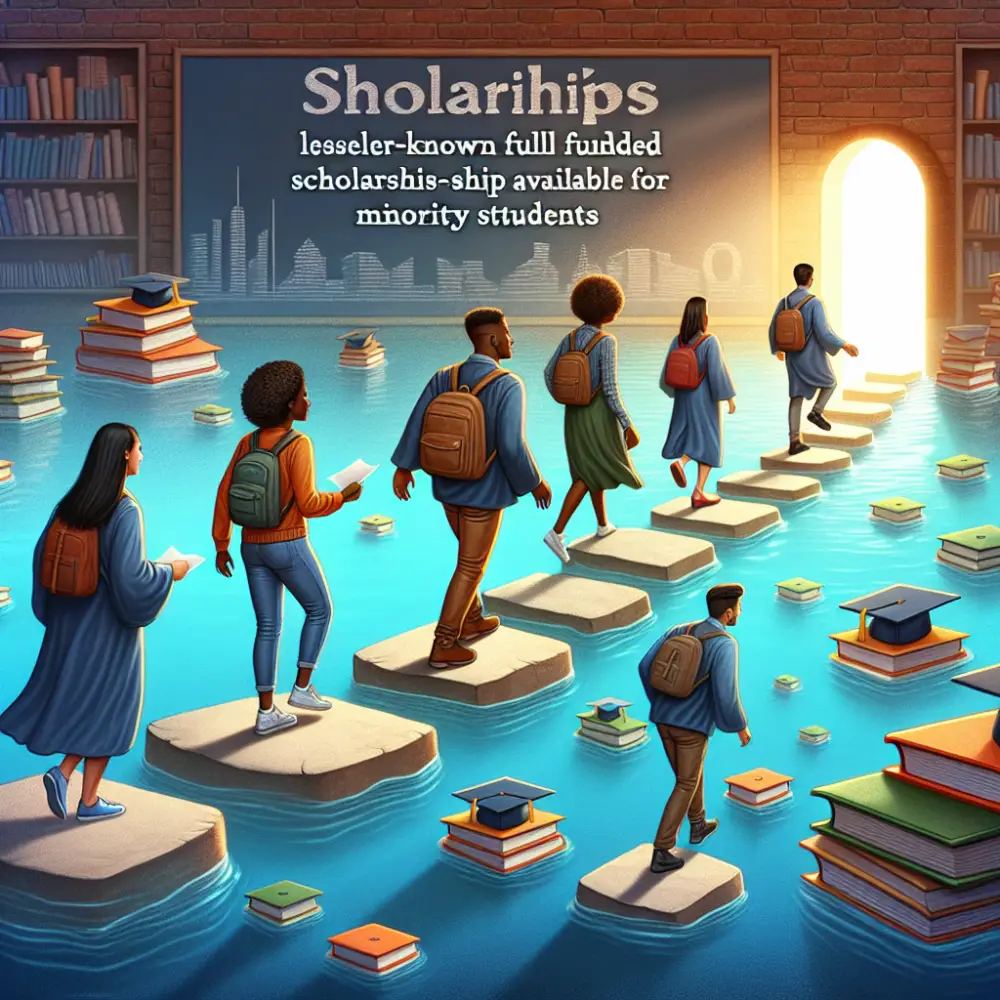
Navigating Lesser-Known Fully Funded Scholarships for Minority Students
Higher education can open many doors, promising new opportunities and brighter futures. However, the rising costs of tuition, books, and living expenses pose significant challenges for many students, especially those from minority backgrounds. Understanding that financial barriers often limit access to education, numerous scholarships are available to help minority students achieve their academic dreams. However, while most are familiar with popular scholarships like the Gates Millennium Scholars Program, many lesser-known fully funded scholarships remain unexplored. This article delves into these hidden gems, guiding minority students on how to uncover and utilize them effectively.
Understanding the Importance of Fully Funded Scholarships
A fully funded scholarship covers tuition, fees, book costs, and often living expenses, ensuring students can focus entirely on their studies without financial burdens. For minority students, these scholarships can mean the difference between attending college and foregoing it altogether. Such scholarships not only alleviate financial strain but also recognize and reward students’ hard work and potential. They play a vital role in fostering diversity and inclusion within higher education institutions, creating environments where everyone, regardless of background, can thrive.
Why Are Lesser-Known Scholarships Important?
While well-known scholarships receive thousands of applications annually, lesser-known ones tend to have fewer applicants, increasing the chances of selection. Additionally, these scholarships often have specific eligibility criteria that align closely with the unique experiences and challenges faced by minority students. By seeking out these scholarships, students can find tailored support that matches their individual circumstances more precisely than broader funding options.
Researching Lesser-Known Scholarships
The journey to discovering lesser-known scholarships begins with thorough research. Students should explore various resources:
-
Guidance Counselors and Academic Advisors: These professionals often have access to extensive scholarship databases and can provide personalized guidance.
-
University Financial Aid Offices: Colleges and universities frequently offer scholarships specific to their institution, many of which are designed to support minority students.
-
Scholarship Databases: Online platforms like Fastweb, Cappex, and Scholarship.com allow users to filter searches based on criteria such as minority status, field of study, and financial need.
-
Community Organizations and Nonprofits: Organizations dedicated to serving minority communities frequently offer scholarships. Examples include the Hispanic Scholarship Fund, the United Negro College Fund (UNCF), and the Native American Scholarship Fund.
Highlighted Lesser-Known Scholarships for Minority Students
- The Jackie Robinson Foundation Scholarship
Named after the groundbreaking African American baseball player, this scholarship aims to benefit minority students displaying leadership potential and financial need. Besides substantial financial support, it also offers mentorship, internship placement, and professional development opportunities. The holistic support means recipients are well-rounded and well-prepared for post-collegiate life.
- The Patsy Takemoto Mink Education Foundation Scholarships
In honor of Patsy Takemoto Mink, the first woman of color elected to the U.S. House of Representatives, these scholarships support low-income women, particularly mothers, pursuing education. Recipients are chosen based on financial need, personal circumstances, educational goals, and career aspirations.
- The Ron Brown Scholar Program
This program is dedicated to African American high school seniors who demonstrate academic excellence, leadership potential, and financial need. Ron Brown Scholars receive a four-year scholarship that covers most college expenses. Additionally, scholars join a tightly-knit community providing support, networking, and resources long after graduation.
- The EPP/MSI Undergraduate Scholarship Program
Offered by the National Oceanic and Atmospheric Administration (NOAA), this scholarship targets minority students majoring in STEM fields related to NOAA’s mission. Besides tuition support, recipients participate in paid summer internships and have opportunities to travel while working on research projects.
- The AICPA Scholarship for Minority Accounting Students
For those interested in accounting, the American Institute of CPAs offers substantial scholarships to minority students pursuing accounting degrees. These scholarships not only ease financial burdens but can also open doors to various networking events, mentoring programs, and professional opportunities within the field.
How to Apply for These Scholarships
Successfully applying for these scholarships involves several critical steps:
-
Understand the Eligibility Criteria: Thoroughly read all requirements to ensure eligibility before investing time in your application.
-
Gather Necessary Documentation: This might include transcripts, letters of recommendation, essays, proof of financial need, and details about extracurricular activities and community service.
-
Prepare a Strong Personal Statement: Your personal statement or essay often weighs heavily in the selection process. Speak authentically about your experiences, challenges, aspirations, and why you’re a good fit for the scholarship.
-
Seek Recommendations: Letters of recommendation should come from individuals who know you well and can speak to your qualifications, character, and potential.
-
Submit Complete and On-Time Applications: Pay attention to deadlines and ensure that your application is complete with all required documents. Incomplete or late submissions will typically not be considered.
Tips for Standing Out
-
Show Genuine Passion and Ambition: Scholarship committees look for students who show a clear passion for their chosen field and a desire to make a positive impact in their communities.
-
Highlight Leadership and Community Engagement: Demonstrating your involvement in extracurricular activities, leadership roles, and community service can distinguish you from other applicants.
-
Detail Overcoming Adversities: Many scholarships appreciate stories of resilience. If applicable, discuss any hardships you’ve faced and how you’ve worked to overcome them.
Utilizing Campus Resources
Once on campus, students should take full advantage of available resources such as diversity offices, mentorship programs, academic support centers, and cultural organizations. These resources can provide additional scholarship opportunities, networking events, and community support. Professors and academic advisors can also be invaluable allies in your scholarship journey.
Paying It Forward
Recipients of fully funded scholarships often feel a profound sense of gratitude and responsibility to give back. Scholarships are investments in students’ futures, and many choose to pay it forward by mentoring younger students, participating in community service, or eventually contributing to scholarship funds themselves. This spirit of giving back strengthens the cycle of support, helping more minority students access the benefits of higher education.
Conclusion
Navigating the world of lesser-known fully funded scholarships may require more effort, but the rewards are well worth it. These scholarships not only provide financial relief but also recognize and support the unique journeys of minority students. By diligently researching, thoughtfully applying, and making the most of campus resources, minority students can unlock educational opportunities that may have otherwise seemed out of reach. Ultimately, these scholarships are more than just financial aid; they are stepping stones toward building diverse and inclusive futures, where everyone has the chance to succeed and contribute to society.













Please I have a bachelor degree in Integrated Business Studies from University for Development Studies in Ghana, with seven years work experience in banking. Please do I qualify for scholarship to have my masters here?
To determine if you qualify for a scholarship to pursue your master’s degree, you’ll need to consider various factors such as eligibility criteria, field of study, and the specific requirements of the scholarship programs. Here are some general steps and tips that can help you:
1. **Eligibility Requirements:**
– **Academic Qualifications**: Your bachelor’s degree in Integrated Business Studies from the University for Development Studies in Ghana should generally qualify you academically for most master’s programs.
– **Work Experience**: Your seven years of work experience in banking is a significant asset and can make your application more competitive, especially for scholarships that value professional experience.
2. **Types of Scholarships:**
– **Merit-Based Scholarships**: These are awarded based on academic achievement, professional accomplishments, or other merit-based criteria.
– **Need-Based Scholarships**: These take into account your financial situation.
– **Field-Specific Scholarships**: Some scholarships are specific to certain fields of study or industries.
3. **Application Components:**
– **Personal Statement/Essay**: Clearly articulate your career goals, how the master’s program aligns with these goals, and how your background makes you a suitable candidate.
– **Letters of Recommendation**: Obtain strong recommendations from employers or academic mentors who can speak to your qualifications and potential.
– **Academic Transcripts**: Ensure that your academic records meet the requirements.
4. **Country-Specific Opportunities:**
Look into scholarships offered by institutions or governments specifically for international students from developing countries like Ghana.
5. **Application Deadlines:**
Be mindful of application deadlines and start preparing early.
6. **Other Considerations:**
Some scholarships might require standardized test scores (e.g., GRE or GMAT), so check if these are necessary and prepare accordingly.
Given your academic background and professional experience, you likely meet many basic qualifications for various scholarships. However, each scholarship has its own set of specific eligibility criteria that you’ll need to meet.
For more detailed information tailored to specific scholarships available to you, I recommend using sources like Pick A Scholarship which offers a comprehensive list of scholarships fitting various profiles.
Good luck with your pursuit of higher education!